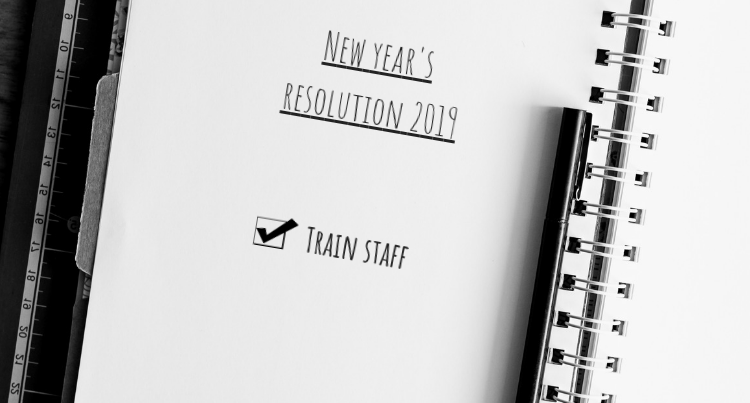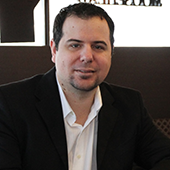Another year has passed us by. It’s time to reflect and make even greater improvements in your restaurant, bar, cafe, or hospitality business. Whether you believe in developing resolutions or not, your mindset for the upcoming year needs to be about “determination”.

You must be determined to achieve your goals.
You must have a strong team to help achieve those goals.
And a strong team starts with effective training!
Let’s be honest, there’s a good chance your training fell off the track a bit leading into the festive season. That’s okay – we’re going to make sure that doesn’t happen again this coming year!
1. Year in review
Let’s first start with a review and remember that a yearly review is not just about looking at the financial statements of the past year.
You must create an opportunity to hold a team meeting and truly listen to your staff. Engage in a positive, organized conversation. What did they enjoy and maybe not enjoy about the past year? What did each department or individual learn? What challenges did each of them face?
How was your staff on-boarding, training, job scope, pay scale, scheduling, communication, and overall leadership perceived by each individual on your team? What strengths do you as an owner, operator, or manager possess moving forward in the New Year in terms of personnel and what areas need to be addressed?
This crucial data will be a key factor in developing your training plan.
2. The training plan
The first thing to remember is that all training plans are a work in progress. You are not going to be able to sit down and write ‘the perfect plan’ in one day or one week — there will be tweaks and revisions along the way (similar to a business plan) and the most important thing to do is just get started and be determined to improve your business based on the feedback from your staff meeting.
The foundations to improvement include setting clear expectations, communication, and a positive working environment which ultimately starts with strategic on-boarding and structured training.
That’s right - the value of a training plan lies within its structure. A winning training plan or ‘program’ will not try to train an employee all in one day, and you shouldn't expect new hires to remember everything they learn in one session for the rest of their employment.
It is imperative that a training plan also includes refreshers and reviews, something that can be done in pre-shift meetings, during a restaurant’s periodic downtime or even at home if your staff are using online training tools.
A starting point or ‘checklist’ for your training plan should include the following headings:
- Review/Revision of key statements (Vision, Mission, Value, Culture)
- Strong job descriptions that match those statements and each individual job scope
- Review/Revision of pay scales and staff progression strategies
- Review/Revision of all staff related documentation and HR compliances
- Effective and memorable on-boarding strategies for your new hires
- Review/Revision of all operation manuals (opening, closing, equipment, pos, cleaning etc.)
- Creation of service sequences and guest experience ‘touch points’ (menu development including item specs and recipe books, customer service, up-selling opportunities, team communication etc.) for each position
- Creation of a detailed staff training schedule for both new hires and currently employed staff. Create a chart or program that allows for a ‘sign-off’ of each completed task
- Creation of a ‘training team’ to ensure consistency in instruction, demonstration, job shadowing, hands-on supervision, and accountability
- Creation of ‘cross training’ opportunities to maximize production and control labor costs
- Creation of a schedule to review individual staff performances and the training plan in its entirety - each quarter at minimum
- Creation of staff performance benchmarks, rewards, and staff experience strategies
- Creation of a secret shopper program to promote healthy feedback on training, service, and overall guest experiences

3. Training assistance
When it comes to team and individual training – remember the demographics of your staff. Perhaps they will engage with your training program better through the use of video or augmented reality. Or perhaps they will benefit from available training platforms such as Typsy.
As the industry progresses in terms of technology – keep an open mind and implement technology where it will assist and benefit your operations without fully retracting from the human element and interaction the hospitality industry is built upon. If you are unsure whether new training technologies will fit in with your business, narrow down the positives and negatives and go from there.
4. Strategy meetings
Using your developed plan and all of this collected information you can begin to develop SMART plans for each individual member of your team.
If you’re unsure of what this might mean, SMART stands for Specific, Measurable, Attainable, Realistic, and Timely.
For example: Once you identify an area where an employee needs training, list it as an objective on their individual plan, clearly stating the expectations for how the employee is going to learn the skill and how proficient they are expected to be at the completion of the training. For each individual goal; determine the training timeline and a progressive reward. Agree to a timeline for each goal and create ownership of it by signing it with your own signatures.
Take these SMART goals and discuss them with your entire team during the second team meeting. Having meetings with your team on a scheduled, regular basis regarding performance and progress will provide and receive ongoing feedback with desirable results.
In summary, you want to develop systems, experiences, confidence, morale, and consistency within your training which will set the expectations needed to successfully operate.
If you have determination, the detailed planning, and the correct leadership, any previous on-boarding and training nightmares or seasonal fall-offs will simultaneously go away; benefiting your bottom line.
Get back in the training groove with Typsy's online hospitality courses and lessons. Your staff will be learning new tricks in less than five minutes. Sign your business up today and get the first 10 day's FREE!
 |
As the Founder & President of KRG Hospitality Inc. in addition to being the author of the book ‘Bar Hacks’, Doug Radkey’s impressive career spans more than two decades and includes all aspects of food, beverage, and hospitality development. This storied brand has proven success since 2009, throughout a variety of markets found within Canada, The United States, and abroad by being a creative agency with a focus on planning, development, and support for independent restaurants, bars, hotels, and other hospitality related properties. |
You might also like: